news
Sanwo-Olu’s development agenda for Lagos
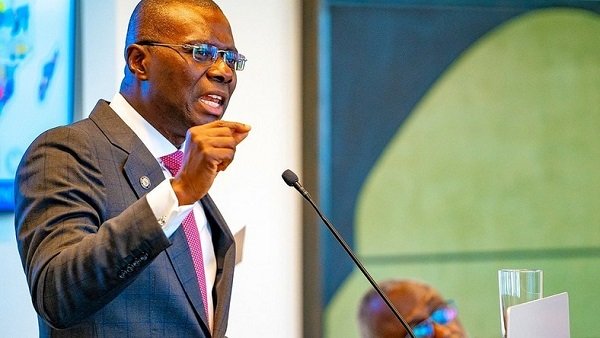

At the outset, the perception of many Lagosians about the Babajide Sanwo-Olu administration was not entirely a positive one. Based on the performance of his predecessors in office since 1999, Lagosians were not convinced that he could step onto their shoes.
Given the mountain of work in all sectors in Lagos somehow Governor Sanwo-Olu’s gentle mien did not fit into the mold of a performer in the eyes of some residents.
But, almost one year after, the ruling All Progressives Congress (APC) in Lagos has once again proved critics wrong.
Since the inception of the administration, Governor Sanwo-Olu has been working quietly in several sectors; to continue from where his immediate processor in office, Akinwinmi Ambode stopped, and also to initiate new policies to up the ante in the development of Lagos.
Deputy Governor Obafemi Hamzat recently unfolded some of the blueprints of the administration, sector by sector, in an interview with the editorial team of the News Agency of Nigeria (NAN).
In the education sector, for instance, Dr. Hamzat said the administration has embarked on a policy reform, which is dubbed ‘Eko Excel’, the state is re-engineering its teaching methods and also adopting a holistic approach to tackling challenges in the sector, to bring out the best in the pupils.
He said: “We started with 300 schools. What that means is that all the primary school teachers will have a tablet that allows them to concentrate on teaching so that they do not need to do all the teachers note that needs to be done and schedule of work.
We have trained them in knowing the essence of teaching. Just changing the essence of teaching and even how they talk to the children/address them. Even if a child does something wrong, there are ways of correcting them.
“Around the world, the focus has always been on the provision of equipment for the classrooms and to have a great classroom for learning but those things don’t teach children as it does not mean the children will come out well. You might have a great classroom but it does not make anything.
So over time, what the state government has done is to focus on the teachers as they are the common denominators. It means we must concentrate on the teachers. They are the common denominator.
“After six years the children will go but the teachers remain over and over again. So we realise that the best thing to do is to concentrate on the teachers, their welfare, skills, their training and the way they approach it. That is what Eko Excel is doing.”
The deputy governor said it is too early to assess the impact of the scheme. He added: “In two to three years’ time, we would see how the teaching method has changed. We would see how it has affected the culture of our education, the children and everything.
We would also be able to gather information better through the equipment that will help us to geo-reference. So, we can know, for instance, in class 4A in Agidingbi Primary School, 20 students came to class or 21 children came at 9 am. – so why are they coming to school late? Is it that they are living far from school?
“All this information will help us to plan well. Also, it has helped us in monitoring the time the teachers resume work.
Also, if a teacher is coming late to school, why is it so? For example, a teacher teaching in Ikorodu and living in Oworonshoki, so why can’t we just move the teacher to around the place he or she lives for convenience and good delivery on the job.
“We are also finding out that some schools have only seven children while in some schools they have up to 60. So it tells us that in some cases, maybe we are building in the wrong places.
So, maybe we need to build more classes in such areas because, in some local governments, the number of children in school is extremely small compared to some others.”
Another component of Eko Excel, the deputy governor said, would address malnutrition among school children. He said primary education is the foundation of development and that it is important to fix it.
He said studies show that 52 per cent of children under five years of age in the northern part of the country are malnourished. He said in the south the percentage is about 20.
Hamzat said while it is necessary to build roads, provide amenities and other things that it is equally important to take care of the younger population by addressing malnutrition among children between the ages of zero to five because, as doctors have told us, this is the time the brain develops.
He said: “So we have a committee on nutrition and also a department on nutrition but what is surprising is that study shows that it is not the children of the poor that are mostly malnourished. The children of the rich and middle class can actually be malnourished as well if they are not eating right because as children they like to eat anything.
“If we can reduce that number, it would be a fantastic achievement even though it is not something that people like to talk about but the impact will be good because we would now build children that are healthy and intelligent thereby the future of our country will be secured.”
On the health, he said the Lagos State Government has increased the budget to the sector by almost 70 per cent and are planning to build new hospitals across the state.
He said: “We want to make sure that every part of Lagos is covered in terms of healthcare delivery services. For instance, we are planning to build a General Hospital in Ojo; that axis doesn’t seem to have any at the moment. We are also planning to build a spinal injury hospital somewhere in Gbagada.
We are also getting people to help us design as we have been made to understand that a lot of our General Hospitals needs to be redesigned.
“For example, you go to UCH, Ibadan at night without air conditioner (AC) you feel cold because of the architectural design. It is designed so that air can pass through… that is cross ventilation. We have gotten people that design hospitals for the tropics.”
Hamzat said the government is not just interested in building new structures, but building ones that are easier to maintain and allows for ventilation.
He added: “Part of the challenge in most hospitals is that you go for the treatment of one ailment and later get infected with another thing.
So these are the questions we asked our medical team. We are not medical doctors but we know these things happen. So, we are redesigning our hospitals.”
On the hardship imposed on residents by the ban on commercial motorcycle and tricycle operators, otherwise known as Okada and Keke by the government, Dr. Hamzat said the underlying motive behind the policy is to reduce accidents on the roads and thereby preserve the lives of Lagosians.
He said: “The most important thing for us is that people must be alive before they can do anything. When life is lost, then there is really nothing else. It’s the dead end.
So for us what is important is how do we secure this society? There are details and information that the government sometimes has that you can’t even share with citizens because they won’t be able to sleep if you divulge such information.”
The deputy governor said critics of the policy have been insisting that alternatives ought to have been put in place before the ban came into effect.
He said: “But, I disagree because it will have been too late if we delayed further; if we failed to secure the lives of our children we will be very irresponsible. That is why it was restricted in certain areas where we saw the upsurge.”
On the menace of members of the National Union of Road Transport Workers (NURTW) on Lagos roads, the deputy governor said the challenge is that it is a national union recognised by law.
He said like the Association of Academic Union of Universities (ASUU), there are many things that members of the union do that the state government does not support, “but as a union recognised by law in our country, we will keep engaging them in dialogue.”
He said: “Whether we like it or not, they have some roles that they play in the transportation sector because you know what, the transportation sector is not something that private people go into without subsidy from government all over the world.
But they are doing it without such assistance, so we must find a way to make it better for them and for us as a people. The engagement must continue for us to have a peaceful society.”
The deputy governor spoke extensively on the traffic gridlock in Lagos, attributing it, for the most part, to the breakdown of vehicles, which impede the free flow of traffic.
The Lagos number two citizen also attributed the traffic gridlock to ongoing road constructions in various parts of the city. He said: “For instance, at Ojota, we are replacing the whole stretch of Ikorodu Road with concrete. At Apapa-Oshodi Expressway, we are also doing concrete.
The problem is that on that corridor, we are doing 300 metres every day but it takes 14 days to execute it properly.
So, because it takes 14 days, no vehicle can pass within those number days. It means that for a long time, that corridor would continue to experience traffic while the project is ongoing. a challenge about there.
“In fact, it is one of the reasons that we are talking to the company that maybe we should use reinforced bitumen rather than concrete, particularly as the construction work approaches Oworonshoki.”
Alaka, he added, is also experiencing a similar traffic gridlock because of the expansion project also ongoing there, it is a problem.
Because a lot of these things are happening, there will be (gridlock). “But, I think it is better to do it once and in another six or seven months, everybody will be okay,” he added.
Hamzat said the administration is taking advantage of the body of water that surrounds Lagos, by developing water transport. He said 14 boats were recently purchased and are being used to convey people in a most comfortable way.
He urged many residents along the coastal line to take advantage of the waterways to get to their destinations, and thereby reduce pressure on the roads.
His words: “We need the water not just to farm but also for transportation. The Lagos State Government just procured those 14 new boats. The beauty of it is that all those boats were built in Nigeria. Of course, we brought the engine, but we have been able to build that capacity to build boats.”
Hamzat said Lagos deserves a special status because of the nature of the responsibilities it is shouldering within the Nigerian federation. He said the state is pursuing it through a bill on the floor of the Senate initiated by Senator Oluremi Tinubu.
He said: “We are pushing it; maybe we are going about it in a different way. It might not be in the newspapers. It is by talking to everybody that is involved in the process. It is really going on but in a different way. If something is not working in a particular way, you try another approach.”
On the perceived heavy borrowing in Lagos and the debt profile, he said there is no way the government can meet up with the huge infrastructural deficit without borrowing. He said: “There is a musician in Epe in the 1970s; he is dead now.
His name is Ligali Mukaiva; he was not educated, but he said something profound that has stuck to my memory since. I was in primary school then.
The man sang a song that any businessman that doesn’t use other people’s money will not succeed. So, the reality is, where do you get resources to build for today?
“I remember during Asiwaju Tinubu’s government when they took a bond of 15 billion. The opposition said Oh; he has mortgaged the lives of the young people.
That loan has been paid. During BRF government, we took 375 billion bonds, that bond has been paid. Without that, we cannot build the Lekki Link Bridge.”
He said Lagos gets only N8 billion or N9 billion monthly from federal allocation. “By the time you pay salaries, you only have N1 billion left. What can you do with N1 billion? So, the reality is, how do you source the find for infrastructural development?” he said.
news
Breaking : Nigeria Gets New Electoral Act as Tinubu Signs 2026 Reform Bill

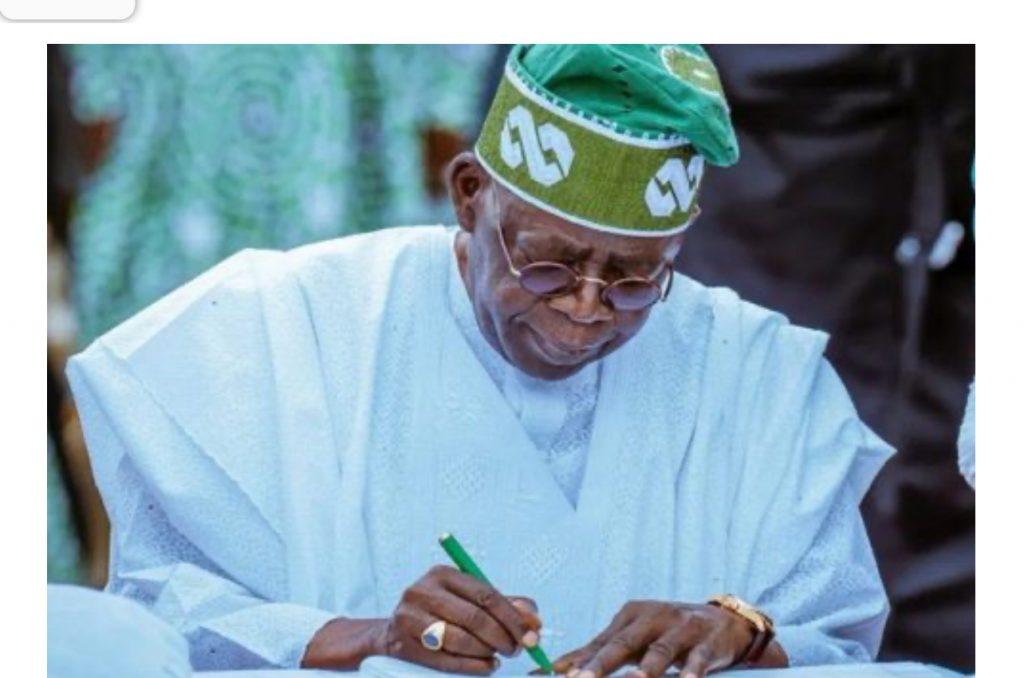
President Bola Tinubu has signed the Electoral Act 2026 (Amendment) into law, days after the Independent National Electoral Commission (INEC) released the timetable for the 2027 general elections.
The signing ceremony took place at the State House, Abuja, at about 5:00pm on Wednesday, with principal officers of the National Assembly in attendance.
The National Assembly had on Tuesday passed the Electoral Act 2026 (Amendment) Bill.
The latest amendment comes amid intense public debate over the electronic transmission of election results in real time.
Last week, protests erupted at the National Assembly complex as civil society organisations and opposition figures mounted pressure on lawmakers to mandate live transmission of results from polling units directly to INEC’s central server.
The protesters argued that real-time transmission would reduce result manipulation and strengthen public confidence in the electoral process.
However, the ruling All Progressives Congress (APC) and some stakeholders have raised concerns about the technical feasibility of live transmission, particularly in communities with weak telecommunications infrastructure. They have argued for a phased or hybrid approach that would allow manual collation where electronic systems fail.
news
EFCC Extends El-Rufai’s Stay in Custody Amid ₦432bn Probe
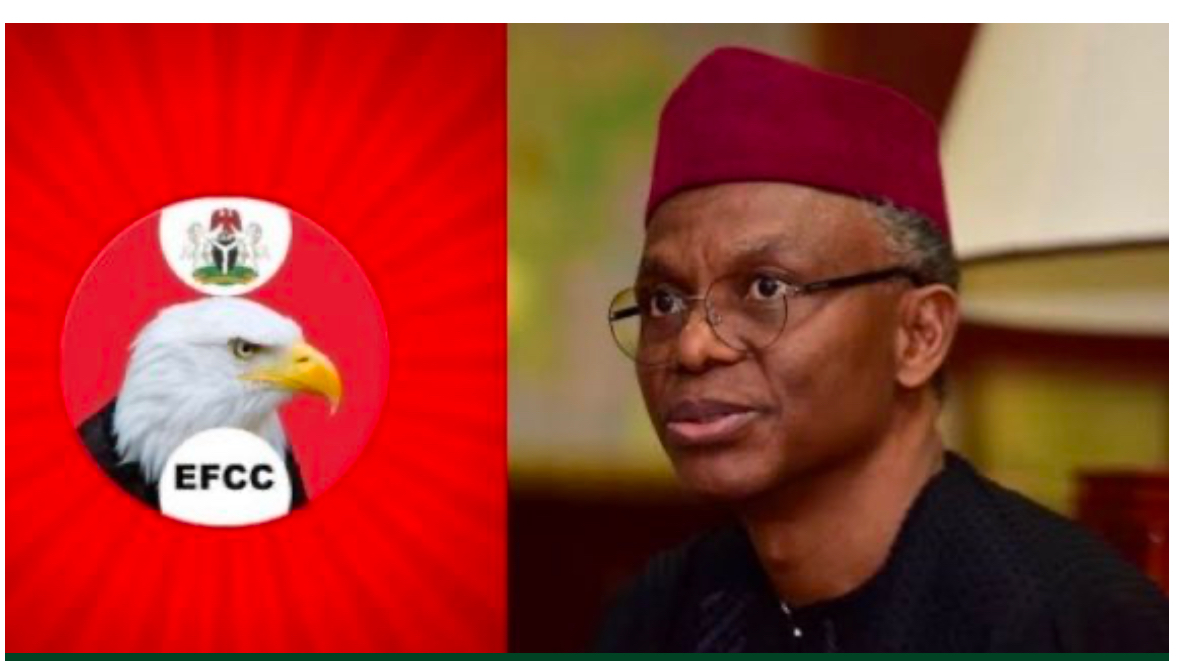
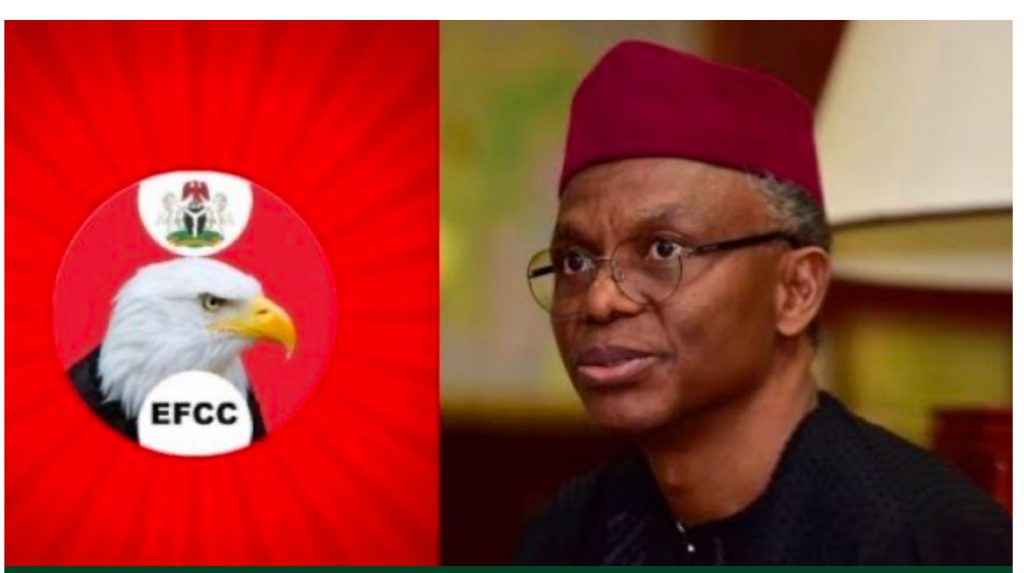
Former Kaduna State Governor, Nasir El-Rufai, on Tuesday spent the second night in the custody of the Economic and Financial Crimes Commission, as his lawyer, A.U Mustapha (SAN), pushes for his release on bail.
There are, however, indications that the commission may seek a remand order to extend his stay in custody to enable him to respond to questions posed by investigators handling his matter.
The former governor arrived at the EFCC headquarters in Abuja on Monday around 10 a.m. for questioning in connection with an alleged N432bn corruption probe. He was, however, detained at the commission, where investigators continued to grill him.
An official of the commission who pleaded anonymity said the anti-graft agency was considering obtaining a remand order after the expiration of the hours allowed by law to enable investigators conclude questioning him.
“Forget the speculations being peddled on social media that he has been released. He has not. El-Rufai is still with us and will be spending another night in custody.
“He is very much with us and will remain so because the investigators are considering getting a remand order after the expiration of the 48 hours allowed by law.
“The investigators need some time with him to answer questions arising from his eight years as governor in Kaduna State,” the source said.
Speaking in a telephone conversation with The PUNCH on Tuesday, El-Rufai’s counsel, Mustapha, confirmed that the former governor remained with the anti-graft agency, while insisting that his client had fully cooperated with investigators.
He described his client as a responsible citizen who is not a flight risk if granted bail.
Mustapha said, “Well, as a responsible citizen, he was invited and, true to his word, he honoured the invitation.
“As we speak, he is still with the EFCC. He is cooperating to the best of his capacity, and we hope that the EFCC, given its integrity, will be kind enough to admit him to bail because he is presumed innocent, and I am sure if he is granted bail, he will not jump bail.
“He is a responsible citizen, and everybody knows him. He came to Nigeria on his own volition. He wrote a letter that he was going to honour the EFCC invitation, and he kept his word as a man of integrity. We’re hopeful that very soon he will be granted bail.”
When asked about the specific allegations against his client, Mustapha declined to offer details.
“You’re asking the right question from the wrong person. That question can only be answered by the EFCC and not by me. I would just be speculating, and lawyers don’t do that.”
Pressed further on whether he witnessed parts of the interrogation and what it was about, Mustapha responded, “That would be prejudicial. It’s a confidential matter and not meant for public consumption.”
The EFCC’s interrogation is linked to the report of an ad hoc committee of the Kaduna State House of Assembly set up in 2024 to probe finances, loans, and contracts awarded between 2015 and 2023 during El-Rufai’s administration.
EFCC extends El-Rufai detention, Plateau indigenes killed, other top stories
Rep backs real-time electronic transmission of election results
The committee, chaired by Henry Zacharia, had alleged that several loans obtained during the period were not utilised for their intended purposes.
While presenting the report, the Speaker, Yusuf Dahiru Leman, claimed that about N423bn was allegedly siphoned under the former governor’s administration.
The committee recommended the investigation and prosecution of El-Rufai and some former cabinet members over alleged abuse of office, diversion of public funds, money laundering, contract awards without due process, and reckless borrowing.
The Assembly subsequently forwarded petitions to the EFCC and the Independent Corrupt Practices and Other Related Offences Commission.
El-Rufai has denied the allegations, describing the probe as politically motivated, and insisted that loans obtained during his tenure were properly appropriated and used for infrastructure, education, healthcare, and security.
On Monday, an EFCC source said the commission had been investigating the matter for about a year, noting that suspects are usually invited after investigations have reached an advanced stage.
“The commission has been investigating him for about a year now. As a commission, we don’t just rush to invite suspects. Persons accused are always the last; that is, after we might have done our investigation to an advanced stage.
“We are investigating him on the allegations against him by the Kaduna State Assembly,” the source said.
Meanwhile, in a separate development, the Department of State Services has filed criminal charges against El-Rufai before the Federal High Court in Abuja over alleged unlawful interception of the phone communications of the National Security Adviser, Nuhu Ribadu.
The three-count charge, marked FHC/ABJ/CR/99/2026, was filed under the Cybercrimes (Prohibition, Prevention, etc.) Amendment Act, 2024, and the Nigerian Communications Act, 2003.
According to the charge sheet, El-Rufai allegedly admitted during a February 13, 2026, appearance on Arise TV’s Prime Time Programme that he and unnamed associates unlawfully intercepted Ribadu’s communications.
Count One alleged that El-Rufai “did admit during the interview that you and your cohorts unlawfully intercepted the phone communications of the National Security Adviser, Nuhu Ribadu,” an offence said to be punishable under Section 12(1) of the Cybercrimes Amendment Act.
Count Two accused him of acknowledging knowledge of an individual involved in the alleged interception without reporting it to security agencies, while Count Three alleged that he and others still at large used technical equipment that compromised public safety and national security.
The prosecution further claimed that the alleged act, reportedly admitted during the television interview, caused “reasonable apprehension of insecurity among Nigerians.”
He is yet to be arraigned.
news
Real-Time Results: Senate, House Fail to Align on INEC Powers
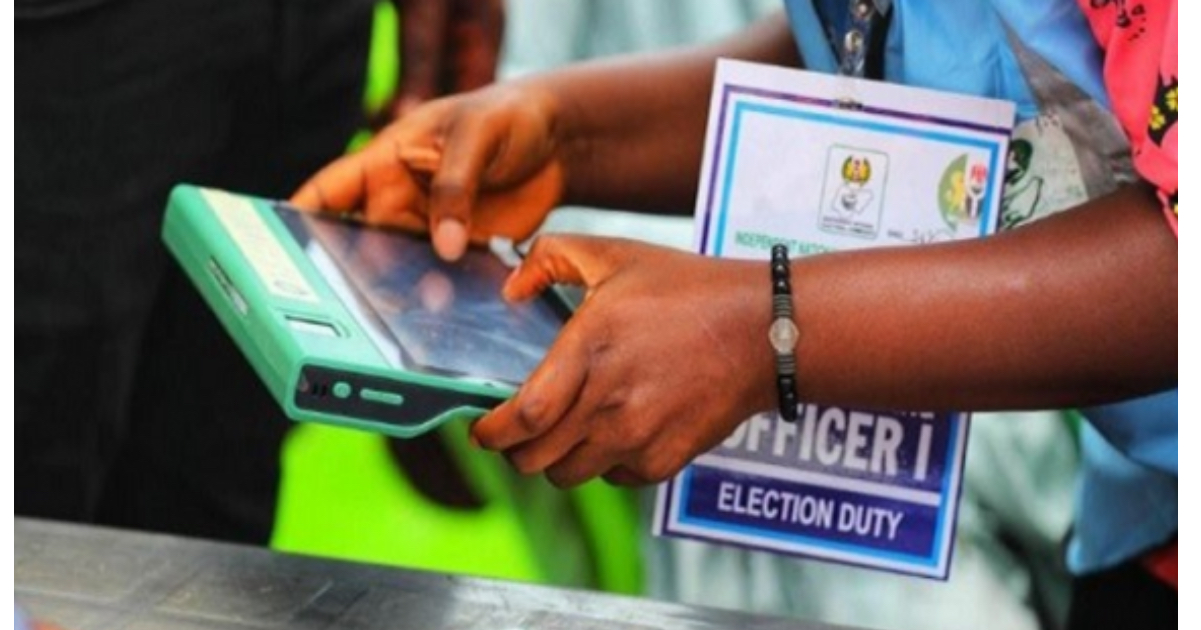
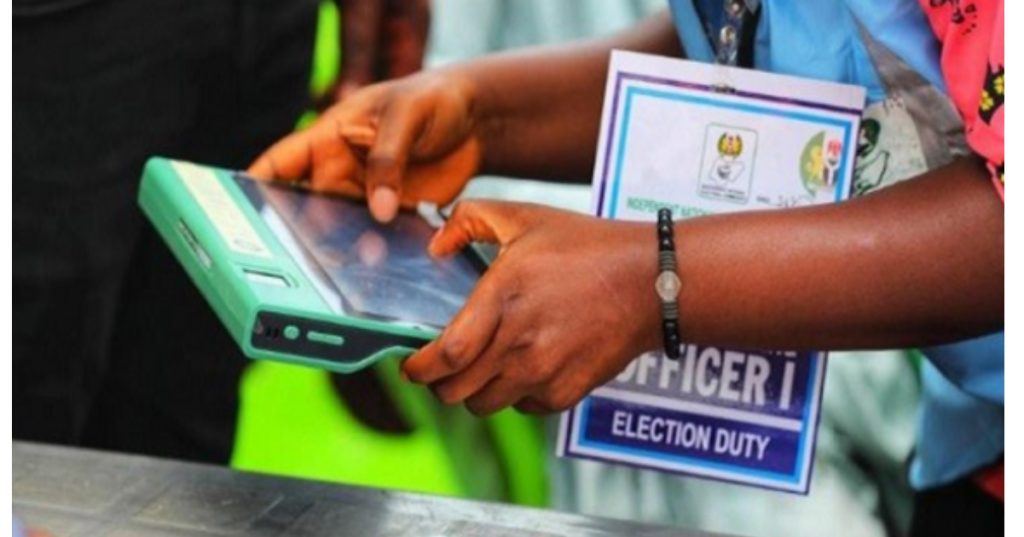
Harmonisation of versions begins •Red Chamber okays e-upload to IREV
The controversy over the passage of the Electoral Act (Amendment) Bill 2026 at the Senate was laid to rest yesterday.
The Red Chamber endorsed electronic transmission of election results, without including the contentious “real-time” provision.
This was shortly before it adopted the Votes and Proceedings of the passage of the Bill, which scaled third reading on February 4, during a rowdy session.
Because the version passed by the Senate did not include “real-time” transmission, unlike the version earlier passed by the House of Representatives, a conference committee of both chambers will harmonise the bills before final approval and eventual presentation for presidential assent.
The amendment of Section 60(3), effected yesterday and passed along with other sections read by Senate President Godswill Akpabio, states: “The Presiding Officer shall electronically transmit the results from each polling unit to the INEC Result Viewing Portal, and such transmission shall be done after the prescribed Form EC8A has been signed and stamped by the Presiding Officer and countersigned by the candidates or polling agents where available at the polling unit.
“But if the electronic transmission of the result fails as a result of communication failure, and it becomes impossible to transmit the result electronically, the signed and stamped Form EC8A by the Presiding Officer, and countersigned by the candidates or polling agents where available, shall in such a case be the primary source of collation and declaration of results.”
This differs slightly from the version passed by the House of Representatives in December, which states: “The Commission shall electronically transmit the results from each polling unit to the IREV portal in real time, and each transmission shall be done simultaneously with the physical collation of results.”
The House also passed Section 60(5), which provides: “The Presiding Officer shall transmit the results, including the number of accredited voters, to the next level of collation.”
The Electoral Act 2022, under which the 2023 elections were conducted and which is in the process of being repealed, states in part under Section 60(5): “The Presiding Officer shall transfer the result, including the total number of accredited voters and the result of the ballot, in a manner as prescribed by the Commission.”
Before senators began proceedings yesterday, protesters, for the second consecutive day, gathered in front of the National Assembly to call for the passage of real-time electronic transmission of election results.
Among the protesters was the former Governor of Rivers State and immediate past Minister of Transportation, Chibuike Amaechi.
The police prevented the protesters from gaining access to the National Assembly complex.
Inside the chamber, the Senate passed the Electoral Act Amendment Bill after a heated debate in a rowdy plenary session.
At the session presided over by Senate President Godswill Akpabio, senators modified their earlier position on real-time electronic transmission of poll results.
They consequently approved a revised clause mandating electronic transmission of results from polling units to the INEC Result Viewing Portal (IREV), with a fallback mechanism in the event of network failure.
In such instances, Form EC8A, on which results are recorded, would serve as the basis for collation.
The amendment, once harmonised with the House of Representatives’ version and signed into law by the President, is expected to legalise the use of IREV in the result transmission process, unlike what obtained during the 2023 elections.
There was palpable tension in the hallowed chamber as the initial proposal to adopt the Votes and Proceedings of the previous sitting led to heated procedural disputes, which were carefully managed by Akpabio.
Outside the National Assembly, protesters continued to agitate for the inclusion of the real-time electronic uploading clause, which had been upheld in the House of Representatives’ version of the bill.
The modification followed the approval of a motion by the Senate Chief Whip, Mohammed Tahir Monguno (Borno North), titled: “Motion for Rescission on Clause 60(3) of the Electoral Act, 2022 (Repeal and Enactment) Bill, 2026.”
Moving the motion, Monguno recalled that the bill had been passed by the Senate on February 4 but said “fresh issues have emerged in respect of Clause 60(3), which require further legislative consideration to ensure the conduct of smooth, transparent and credible elections in Nigeria.”
Invoking Orders 1(b) and 52(6) of the Senate Standing Orders, 2023 (as amended), he urged the chamber to rescind its earlier decision on the clause and recommit it to the Committee of the Whole for reconsideration and passage.
Trouble began when Monguno rose to move the motion while the Senate President was reading out the rules on Votes and Proceedings.
His action triggered confusion, with many senators questioning whether the Senate could revisit a decision already taken within the same legislative session.
Some senators argued that Order 1(b) empowered the Senate to suspend normal procedure.
Following a voice vote, the chamber agreed to allow Monguno to proceed.
Monguno said ambiguity surrounding the earlier amendment, particularly the controversy over the use of the words “transfer” and “transmission” of election results, had generated public concern and required urgent legislative clarification.
He proposed a fresh amendment stipulating that presiding officers at polling units must electronically transmit results to the INEC Result Viewing Portal (IREV) after completing and signing Form EC8A.
He added that where electronic transmission fails due to communication challenges, the signed and stamped Form EC8A would serve as the primary source for collation and declaration of results.
After the motion was seconded by Senator Abba Moro, who described the development as “a victory for democracy,” the chamber descended into disorder when the Senate President declared that the voice vote had carried the amendment.
Several senators protested and invoked Order 72, which allows any senator to challenge the opinion of the presiding officer by calling for a division.
Citing Order 72, Senator Enyinnaya Abaribe demanded individual voting, triggering loud protests, shouts of points of order, and repeated calls to order by Akpabio.
At the height of the confusion, Abaribe withdrew his request for a division, a move that further unsettled the chamber.
Akpabio ruled that Abaribe’s withdrawal stood, thereby upholding the voice vote that carried the amendment.
Following the approval of the revised clause, the Senate adopted the Votes and Proceedings of the previous sitting, bringing the stormy session to a close.
African currency exchange services
To fast-track harmonisation of the Electoral Bill with the House of Representatives’ version, the Senate expanded its conference committee from nine to 12 members to match the number of conferees from the House.
Reps committee
Electoral Reform Bill at harmonisation stage, Reps say
Reps committee summons finance, agriculture ministers, auditor general
The committee is chaired by Senator Simon Bako Lalong, with Mohammed Tahir Monguno, Adamu Aliero, Orji Uzor Kalu, Abba Moro, Asuquo Ekpenyong, Aminu Iyal Abbas, Tokunbo Abiru, Adeniyi Ayodele Adegbonmire, Jibrin Isah (Echocho), Banigo Ipalibo and Onyekachi Nwebonyi as members.
Expressing optimism that the committee would conclude its work swiftly, Akpabio said: “This is a matter of urgency. If you are able to conclude within the next few days or one week, the President should be able to sign this amended Electoral Bill within this month.”
Former Vice President Atiku Abubakar, who spoke in Minna, the capital of Niger State, said electronic transmission of results would restore sanity and avert chaos.
However, he expressed doubts about the ability of the proposed law to guarantee real-time transmission.
Atiku said: “This is below the expectations of Nigerians. During the last elections, Nigerians were expecting real-time electronic transmission of election results at various levels of the election, but what we got was a mixture of electronic and manual uploading, which caused more confusion and chaos.
“It will be best if we have a single-tier electronic transmission, which is real-time electronic transmission, which is the preference of all Nigerians.”
The African Democratic Congress (ADC) stalwart urged opposition political parties to reject the Senate’s decision to allow manual uploading of election results.
He said: “We need all opposition political parties to pursue this issue. We should not allow it to rest the way they wanted it to rest today at the Senate.”
The African Democratic Party (ADP) warned of likely public distrust of the electoral process if electronic transmission is not upheld.
The party’s National Chairman, Yabagi Sani, said in a statement that “while the Senate’s reversal of its earlier rejection of electronic transmission reflects public pressure and democratic expectation, the ADP notes that a reform that does not guarantee mandatory, real-time transmission cannot restore electoral credibility.”
The ADC National Publicity Secretary, Bolaji Abdullahi, described the Senate’s modified position as a victory for the resilience, vigilance and rising political consciousness of Nigerians.
He said in a statement: “It demonstrates, in the clearest possible terms, that when citizens act with unity, clarity of purpose and resolve, they can indeed move mountains.”
The ADC credited Nigerians’ coordinated civic actions, noting: “From the street protests to the digital campaigns, the Nigerian people have once again shown that sovereignty truly belongs to them.”
Hailing the protesters, Abdullahi added: “We salute the courage and tenacity of Nigerians. We commend every citizen who raised a voice, whether online or offline, to resist legislative mischief that threatened to undermine our electoral integrity.”
A former President of the Nigerian Bar Association (NBA), Dr Olisa Agbakoba (SAN), said the adoption of real-time upload of results would engender public trust and close electoral loopholes.
He said the regulatory process must be adequately backed by law.
Agbakoba noted in a statement that the 2023 election exposed a critical gap in the electoral legal framework, recalling that despite INEC’s deployment of the IREV portal for electronic transmission of results, the Supreme Court ruled that the innovation lacked legal force.
The human rights lawyer explained that the IREV portal currently serves only for public viewing and is not admissible as evidence of results in election petitions.
He said: “The message was unmistakable: without explicit statutory provision, electronic transmission remains optional and legally inconsequential, no matter how transparent or efficient it may be.
“This legal gap creates an insurmountable evidentiary burden in election petitions.”
The Tanimu Turaki-led faction of the PDP rejected the Senate’s position on transmission of election results, describing the senators as “clever by half.”
The party’s National Publicity Secretary, Comrade Ini Ememobong, said in a statement that the addendum introduced by the Senate to allow manual transmission was a backdoor attempt to achieve the same objective as the earlier rejection.
The statement reads in part: “We have taken note of the outcome of the Senate’s reconsideration of its earlier position on the real-time electronic transmission of election results, wherein an addendum was introduced to permit manual transmission where technology is said to fail.
“We hold the firm view that this addendum is nothing more than a backdoor attempt to achieve the same objective as the earlier outright rejection, while pretending to align with the wishes of the Nigerian people.
“Manual transmission is already sufficiently provided for under the Electoral Act. The current agitation for electronic transmission is aimed at introducing a second-layer authentication mechanism that prevents the alteration of results en route to collation centres, a malpractice that has historically been the bane of Nigeria’s electoral process.
“Furthermore, it is inconceivable that the same BVAS technology, which successfully undertakes accreditation throughout an election, would suddenly become unreliable for the transmission of results and accreditation data arising from that same exercise.
“This caveat is a clear indication of the humongous fear being harboured by senators opposed to electronic transmission, particularly Senate President Godswill Akpabio, whom we reasonably suspect remains haunted by the ghost of his 2019 election loss, occasioned by the deployment of technology to curb over-voting.
“They must be reminded that Nigeria is bigger than their narrow personal and political interests.
“We therefore urge members of the Conference Committee to adopt the version of the bill passed by the House of Representatives as the harmonised position, if indeed they are committed to delivering credible elections in 2027.
“They must rise above the instincts of politicians fixated on the next election and instead focus on the sustenance of democracy and the protection of future generations.
“Should this democracy fail, the names of Senator Akpabio and all senators who voted against electronic transmission will undoubtedly occupy a conspicuous chapter in the book of infamy.
“We also call on Nigerians to remain resolute in their demand for real-time electronic transmission of election results. This is no time for excuses. This hard-won democracy is far too valuable to be left in the hands of politicians alone.”
-

 news5 years ago
news5 years agoUPDATE: #ENDSARS: CCTV footage of Lekki shootings intact – Says Sanwo – Olu
-

 lifestyle6 years ago
lifestyle6 years agoFormer Miss World: Mixed reactions trail Agbani Darego’s looks
-

 health5 years ago
health5 years agoChairman Agege LG, Ganiyu Egunjobi Receives Covid-19 Vaccines
-

 lifestyle4 years ago
lifestyle4 years agoObateru: Celebrating a Quintessential PR Man at 60
-

 health6 years ago
health6 years agoUPDATE : Nigeria Records 790 new cases of COVID-19
-

 health6 years ago
health6 years agoBREAKING: Nigeria confirms 663 new cases of COVID-19
-

 entertainment1 year ago
entertainment1 year agoAshny Set for Valentine Special and new Album ‘ Femme Fatale’
-

 news9 months ago
news9 months agoBREAKING: Tinubu swears in new NNPCL Board


